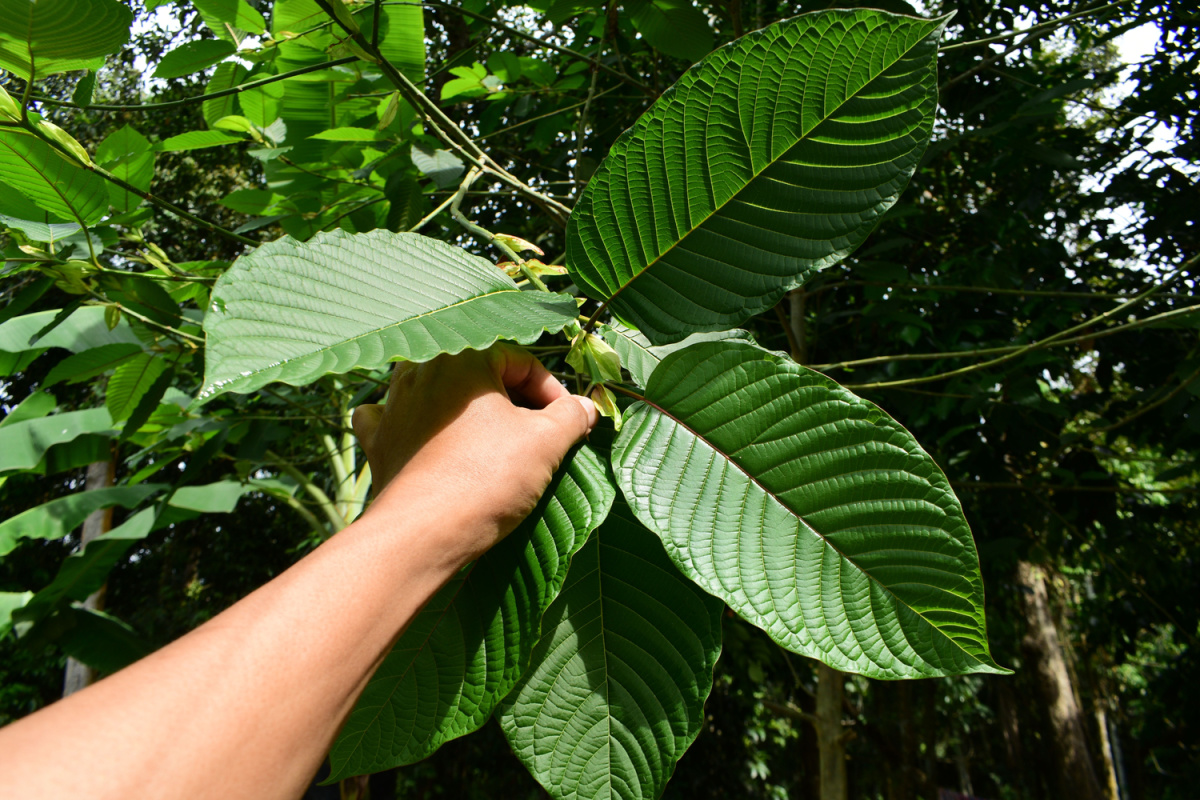What is Kratom?
Kratom, scientifically known as Mitragyna speciosa, is a tropical tree indigenous to Southeast Asia, particularly in countries like Thailand, Malaysia, Indonesia, and Papua New Guinea. It belongs to the Rubiaceae family, which also includes coffee. The plant’s leaves contain active compounds called alkaloids, with mitragynine and 7-hydroxymitragynine being the most prevalent. These alkaloids interact with opioid receptors in the brain, producing various effects ranging from pain relief to mood enhancement.
History of Kratom
Kratom has a rich history of traditional use in Southeast Asian cultures, where it has been utilized for centuries for its medicinal and recreational properties. Indigenous communities chewed the fresh leaves or brewed them into tea to alleviate fatigue, enhance productivity, and relieve pain. Additionally, kratom played a significant role in religious ceremonies and social gatherings, reflecting its cultural significance in the region.
Varieties of Kratom
Kratom comes in several strains, each with its unique composition of alkaloids and effects on the body. Some of the most common strains include:
Bali Kratom: Known for its potent analgesic properties and mild sedation, Bali kratom is popular among individuals seeking pain relief and relaxation.
Maeng Da Kratom: Recognized for its energizing effects and heightened stimulation, Maeng Da kratom is favored by users looking to enhance focus, productivity, and mood.
Borneo Kratom: Borneo kratom is renowned for its balanced effects, offering both pain relief and relaxation without excessive sedation. It’s often used by individuals seeking relief from anxiety and stress.
How Kratom is Used
Traditionally, kratom leaves were consumed by chewing them directly or brewing them into tea. However, with the rise of global interest in kratom, various consumption methods have emerged, including:
Powdered Form: Dried kratom leaves are ground into a fine powder, which can be mixed with water, juice, or other beverages for consumption.
Capsules: Kratom powder is encapsulated into convenient pills, allowing for precise dosage and easy ingestion.
Extracts: Concentrated forms of kratom, such as tinctures or resins, are available for those seeking potent effects.
Evaluating Safety: Research and Studies
Despite its long history of traditional use, scientific research on kratom is relatively limited, particularly regarding its safety and efficacy. However, some studies have explored its pharmacological properties and potential therapeutic effects, including:
Pain Relief: Several studies suggest that kratom may possess analgesic properties, making it a potential alternative for individuals seeking relief from chronic pain conditions.
Mood Enhancement: Kratom’s alkaloids may influence neurotransmitter levels in the brain, leading to mood-enhancing effects and potential relief from anxiety and depression.
Opioid Withdrawal: Preliminary research indicates that kratom may alleviate withdrawal symptoms associated with opioid dependence, although more studies are needed to confirm its efficacy and safety.
Health Benefits
While kratom’s safety remains a subject of debate, some users report experiencing various health benefits from its consumption, including:
Pain Relief
Kratom’s analgesic properties make it a popular choice among individuals seeking relief from chronic pain conditions such as:
- Arthritis
- Fibromyalgia
- Migraines
- Neuropathic pain
Mood Enhancement
Many users report experiencing improved mood and reduced anxiety or depression symptoms after consuming kratom. This mood-enhancing effect is attributed to kratom’s interaction with neurotransmitter systems in the brain, such as serotonin and dopamine.
Increased Energy
Certain kratom strains, such as Maeng Da and Thai, are known for their energizing effects, providing users with a boost in focus, motivation, and physical stamina. This increased energy can be beneficial for individuals seeking to enhance productivity or combat fatigue.
Mitigating Risks and Ensuring Safety
Individuals with pre-existing health conditions should exercise caution when using kratom and consult with healthcare professionals before consumption. Certain medical conditions or medications may interact with kratom, leading to adverse effects or complications. Conditions to be mindful of include:
Liver Disease: Kratom metabolism primarily occurs in the liver, so individuals with liver disease or impaired liver function should use kratom with caution to avoid potential toxicity.
Cardiovascular Conditions: Kratom may increase heart rate and blood pressure, posing risks for individuals with pre-existing cardiovascular conditions such as hypertension or arrhythmias.
Mental Health Disorders: Kratom’s effects on mood and cognition may exacerbate symptoms of mental health disorders such as anxiety, depression, or psychosis.
By being aware of personal health conditions and potential risks, individuals can make informed decisions about kratom usage and minimize harm.
Educating Others on Safe Usage Practices
Promoting awareness and education about kratom safety is crucial for fostering a culture of responsible usage within communities. Consider the following strategies for educating others about safe kratom practices:
Community Workshops: Organize workshops or informational sessions to educate community members about kratom, its effects, and safe usage guidelines.
Online Resources: Share reliable information and resources about kratom safety through online platforms, forums, or social media channels to reach a broader audience.
Peer Support Groups: Establish peer support groups or forums where individuals can share experiences, ask questions, and provide support for one another in navigating kratom usage.
By spreading knowledge and promoting open dialogue, communities can empower individuals to make informed decisions about kratom usage and prioritize their health and well-being.
Kratom in Cultural Context
Respect and acknowledge the cultural significance of kratom in Southeast Asian traditions, where it has been an integral part of indigenous cultures for centuries. Kratom’s traditional use encompasses various rituals, ceremonies, and medicinal practices, reflecting its deep-rooted cultural importance.
Social and Recreational Use Today
Recognize the evolving role of kratom in contemporary society, where it’s increasingly used for recreational and social purposes. While some individuals consume kratom for its therapeutic benefits, others incorporate it into social gatherings or leisure activities, such as:
Kratom Bars: Kratom bars or lounges have emerged in some regions, providing spaces for individuals to gather, socialize, and consume kratom-infused beverages in a communal setting.
Online Communities: Virtual communities and forums dedicated to kratom enthusiasts offer platforms for sharing experiences, tips, and information about kratom usage, fostering a sense of camaraderie and belonging among users.
Stigma and Misconceptions
Address stigma and misconceptions surrounding kratom through education, advocacy, and destigmatization efforts. Common misconceptions about kratom include:
Addiction Stereotypes: Kratom users may face stigmatization or judgment due to misconceptions about addiction and substance use disorders. Combatting these stereotypes requires challenging misconceptions and promoting empathy and understanding.
Safety Concerns: Misinformation about kratom’s safety and potential risks may contribute to stigma and fear surrounding its use. By providing accurate information and evidence-based resources, individuals can dispel myths and misconceptions, empowering others to make informed decisions.
Cultural Sensitivity: Respect cultural differences and perspectives surrounding kratom usage, acknowledging its diverse cultural heritage and significance. Avoid appropriating or trivializing kratom’s cultural context, and engage in respectful dialogue with communities impacted by kratom use.
Advocacy Efforts and Community Support
Support advocacy initiatives and community organizations dedicated to promoting responsible kratom usage, advocating for legal access, and protecting the rights of kratom users. Consider getting involved in advocacy efforts through:
Political Engagement: Participate in lobbying efforts, grassroots campaigns, or legislative advocacy to influence policy decisions and shape kratom regulations at the local, state, and federal levels.
Community Outreach: Engage with local communities, healthcare providers, policymakers, and law enforcement agencies to raise awareness about kratom, address concerns, and build support for sensible regulations.
Consumer Advocacy: Join consumer advocacy groups or organizations dedicated to protecting the rights and interests of kratom users, promoting consumer safety, and advocating for transparent and responsible industry practices.
Finding Balance and Responsibility
Navigating the safety of kratom involves considering multiple factors, including dosage, individual health, sourcing, and consumption patterns. While kratom offers potential benefits, it also poses risks that must be carefully managed and mitigated through responsible usage practices.
If you have any more questions about kratom and our kratom products at Urban Ice Botanicals fill out our contact form today!
FAQs
- Is kratom legal in the United States?
Yes, kratom is legal in most states, although some have imposed restrictions or bans. It’s essential to check local regulations before purchasing or using kratom.
- Can kratom be addictive?
Yes, kratom has addictive potential, especially with frequent and high-dose usage. It’s crucial to use it responsibly and avoid dependence.
- Are there any health risks associated with kratom?
While kratom may offer benefits, it also carries risks, including potential side effects, dependence, and interactions with other substances.
- How can I ensure the quality and safety of kratom products?
Choose reputable vendors, like Urban Ice Botanicals who conduct lab testing and adhere to quality control standards. Look for transparent sourcing and packaging information.





